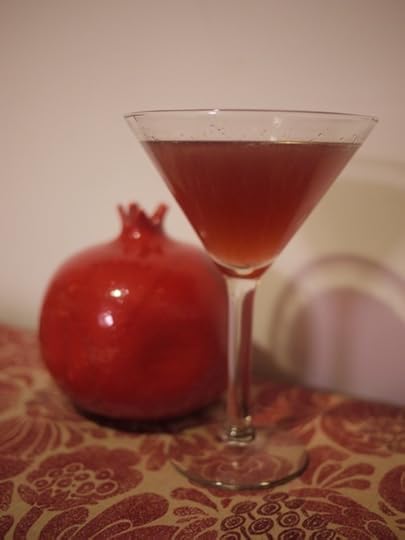Pia Padukone's Blog, page 2
June 24, 2013
The Mothers/40-Garlic Clove Chicken
I suppose it is around this time in my life when I start to think about the idea of being a mother. After all, Rohit and I have been together for about 7 years, and married for nearly one. It’s high time we got there, amongst all the other scare tactics we hear about fertility rates dropping with every cocktail you ingest (that one is fake, I totally made it up as I sit here and sip on my homemade mojito - rather delicious, point of fact). So I was rather intrigued about The Mothers, a book that takes the idea of the desire of motherhood to a whole new plane. One that’s hopefully miles away from where I am in my brain space.
The Mothers, by Jennifer Gilmore, is a heartbreaking look at what it’s like for a couple who cannot have children biologically due to the protagonist’s bout with cancer some years before, and their deep, sorrowful attempt to adopt. I say sorrowful because it seems that they are doomed from the outset: traveling hundreds of miles in one day to visit an adoption center, being strung along and turned down, and just truly wanting to be a parent, so much so that it hurts.
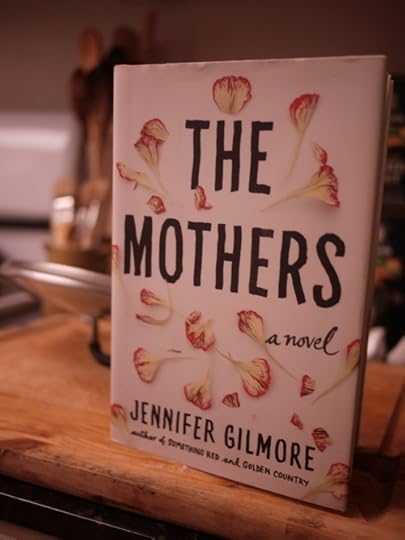
At one point, Jesse is yearning so badly to be a mother that you can sense the gaping maw of what is missing in the pit of your own stomach. There is serious darkness that accompanies this otherwise loving couple, who are thrown into what will hopefully never be anyone’s tragedy.
At the climax of the book (SPOILER ALERT!) Jesse learns that someone very dear to her is pregnant. Someone who didn’t appear to care about being a mother. Someone who seemingly wasn’t even trying. And when that someone comes home from a hiatus of finding herself abroad and Jesse’s mother has them all over to the house to celebrate their family reunion, Jesse finds that she has a lot of troubling rejoicing the happy news. Jesse’s mother - in likely anticipation of this vexing news to one daughter, but ostensibly optimistic indifference from the other - makes a meal that she thinks will calm nerves and comfort raw, overtaxed emotions: her famous 40 garlic clove chicken.
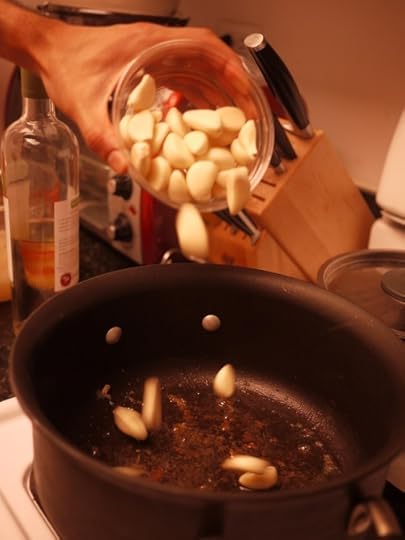
While I can’t proclaim to imagine the feelings that Jesse and her husband have during their trial, I could imagine the hollowness of finding out that someone who didn’t even want a baby has been blessed with one when that is the only thing you want in your life and the only thing you can’t seem to grasp. I wanted that comfort of a mother’s cooking, that warm, gentle wafting of forty cloves of garlic floating through the house as the scent enveloped me like a pair of mothers hands. I wanted that 40-garlic clove chicken.
Rohit did the dish justice, though truth be told, he only used 38 garlic cloves (ssh, I won’t tell if you don’t) and the dish, served alongside a steamed portion of couscous and mint and roasted asparagus with the simplest spritz of lemon juice was a comforting end to a sunny summer day.
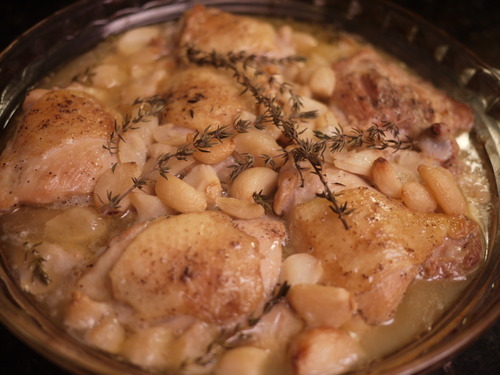
May 2, 2013
Revenge/Strawberry Shortcake
Never have I ever read such a weird, twisted book where I consistently exclaimed (out loud), “Oh, gross, come ON. That’s messed UP,” but still continued to read, mesmerized by the words that Yoko Ogawa put together. This is one of the first books in translation that I have ever enjoyed, which always makes me wonder whether it’s the original that brings me pleasure or what the translator brings to the pages. Regardless, this was one bizarre collection of intertwined short stories that were so skillfully woven together that I found myself smiling each time I recognized a detail from a previous story.
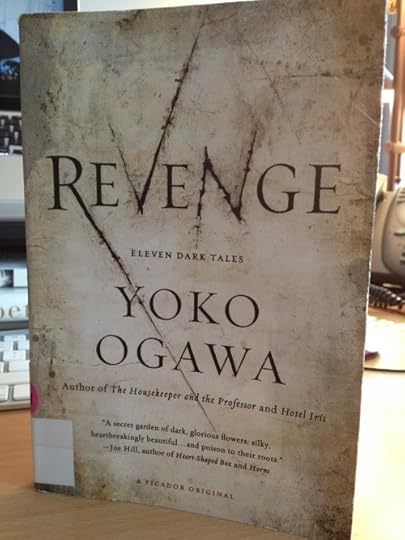
Perhaps unintended, but since the author is Japanese and the original book was written in her native language, I pictured all her characters to be Japanese as well. And perhaps that was short-sighted of me, but I found that I couldn’t help it.
There wasn’t a lot of food within these pages, as the stories were rather grotesque and dark, but there was a baked good that kept materializing that I found myself craving after some time. It was described as a beautiful strawberry shortcake, that the main character of one short story bought each year for her son’s birthday (yes, there is a dark spoiler to this story). Later, the strawberry shortcake finds its way to another story as well as the girl who works in the bakery that makes said strawberry shortcake. And although this particular strawberry shortcake has a rather dreary demise, I still found myself craving it. Am I twisted? Maybe.

Because this was a baking project, I undertook this one and Rohit enjoyed the fruit of my labors (no pun intended). I hadn’t made a strawberry shortcake in a long time. This one was inspired by a recipe I’d seen of a Japanese strawberry shortcake, with a light, airy, fluffy cake, almost angelfood-like in its consistency.

April 12, 2013
The Tennis Partner/Texan Style “Pizza”
I read The Tennis Partner on my way to the Jaipur Literary Festival, where I knew I’d be meeting Abraham Verghese for the first time. The book had introduced me to a man who was coping as hard he could as his marriage crumbled around him and he struggled to connect with his sons who felt estranged from his sons. He was attempting to put his focus into his work as a physician at the hospital, where he was not only in charge of lives, but also of a group of interns who had been placed into his care. He strikes up a friendship with one of the interns who is struggling with his own personal demons of drug addiction, and together the two learn the importance of friendship over many games of semi-competitive tennis. The Abraham in the book was wise, sincere, and flawed. I liked him immensely. He let himself be the bad guy. He let himself be needed.
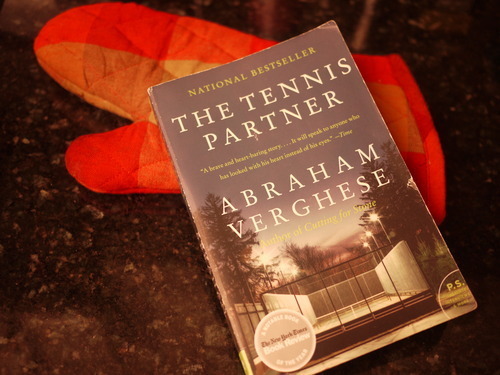
In Jaipur, I met a man who was quiet, dignified and reserved; not exactly the man I’d met within the pages of the book, but the book helped me understand what his friendship with David had meant to him and how it had shaped him for life. Together, the two men struggled with their own romantic relationships: David with drugs and with his volatile on-again, off-again with a beautiful woman and Abraham as his separation from his wife slowly morphs into a divorce. He secures a faceless, empty apartment without any furniture where he orders boxes and boxes of pizza to share with his sons in an attempt to bond with them.
A profound sense of loneliness pervades the book: great despair oozes from each of the men, each grieving separate things and each finding solace in the game of tennis and ultimately, in their friendship with each other. So this book made me crave more than faceless cartons of pizza; it made me crave the countryside that made up El Paso, Texas, a predominantly Hispanic city. It made me want to tap into the roots of the city they lived in and encourage them to eat some real food with soul: El Paso-style pizza.
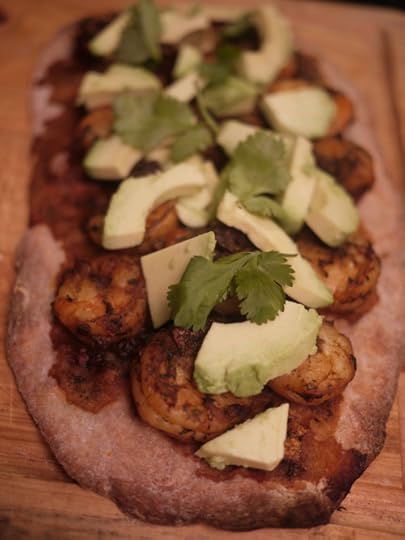
Rohit rolled out his yeast-free flatbreads, inspired by the strong Mexican population in El Paso. The first “pizza” was chipotle-marinated shrimp with roasted poblano peppers and fresh avocado dressed with cilantro. The second was composed of a tomatillo salsa, stewed grape tomatoes and topped with fried red onion. We munched on our pizza and raised a slice to David, who would surely have loved to have shared this meal with his dear friend Abraham.
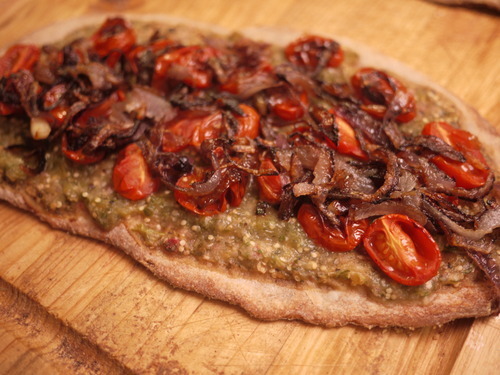
March 28, 2013
The Forgiven/ A Hedonistic Moroccan Feast
I could write a treatise on the independent bookstore and why it’s crucial that it survive the dawn of the Amazon era. However, this simple anecdote that led me to The Forgiven by Lawrence Osborne, proves my point rather well.
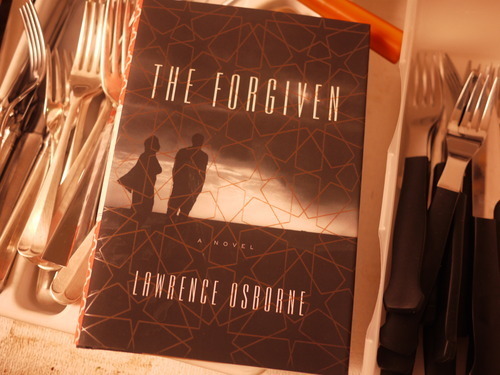
A few weeks ago, I was browsing in Three Lives, an adorable nook of a bookstore in the West Village. I adore this shop for many reasons: when you come upon it, you’ve been traipsing some of the oldest, most beautiful streets in New York, surrounded by the ghosts of Dorothy Parker and Eugene O’Neill. It’s a tiny little shop tucked into a corner frozen in time and when you pass through the threshold, you’re transported back to the bookshops of days past. But the number one reason I adore Three Lives, is because their staff is so incredibly knowledgeable and knows exactly what you want when you yourself aren’t even sure. I had wandered back and forth through the small, appropriated sections of the shop a few times when one of the booksellers approached me.
“You’re absolutely welcome to browse,” he said. “But let me know if I can help you find something.”
“Actually,” I said. “I’m looking for a novel that will pull me in, head over heels and have me reading under my desk at work. Abraham Verghese’s Cutting for Stone did that. I want a repeat performance.”
“I have just the thing,” he said, striding over to a bookshelf. “This book just about killed me. You won’t emerge until you’re done.” When I opened its pages on the train ride home and was sucked immediately in, I was reminded of the power of the independent bookstore.
The Forgiven is a story of a British couple traveling to a raucous, hedonistic party thrown by a gay couple in the middle of a sprawling villa deep in the Atlas Mountains. En route to the party, David and Jo fatally injure a young man selling fossils on the side of the road.
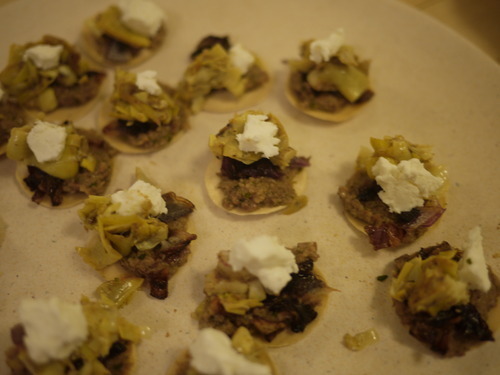
*Papadum boats with ras-al-hanout-marinated artichoke hearts with goat cheese and fried shallot*
What unfolds is a haunting tale of retribution, revenge and hidden secrets. David follows the dead boy’s father into the desert for his funeral while Jo stays behind to “enjoy” the party. Amongst some of the most titillating descriptions of orgiastic activities, culinary delights spun from the likes of Ali Baba’s chef meeting the Mad Hatter and aperitifs that made my mouth water, The Forgiven was replete with some of the most wholesome, desirable descriptions I’d ever read. In fact, upon finishing the book, I felt despondent, as though I could never write like that. But I polished it off, told myself that this book was something to aspire to, and then promptly requested Rohit to make a Moroccan feast that might rival the ones they enjoyed in The Forgiven.
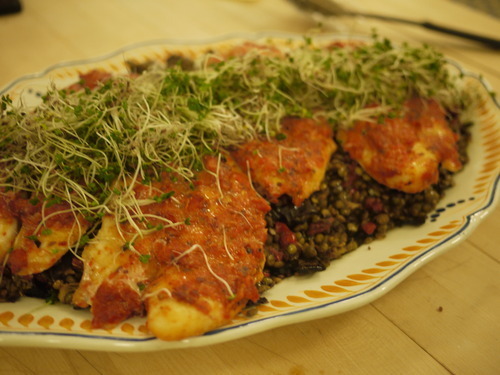
*Harissa-marinated filet of sole with braised lentils, roasted eggplant and broccoli sprouts*
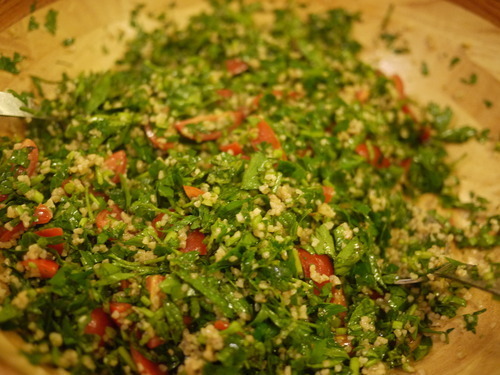
*Tabbouleh salad*
We had visited Morocco in 2007 – we walked through the twisty streets of the market in Fes and the sprawling ones of the market in Marrakech. We took a cooking class and fell in love with the flavors of the country – the tagines, the olives, the ras-al-hanout and orange blossom water, and the honey, oh the honey.
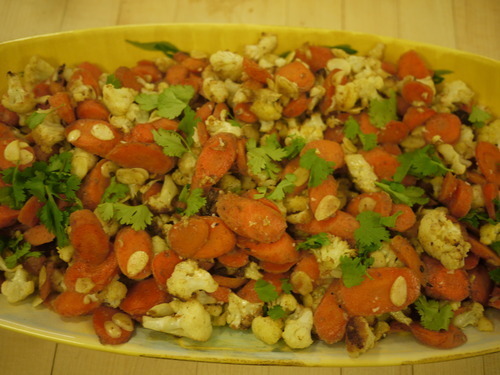
*Roasted cauliflower and sauteed carrots dressed with honey, slivered almonds, cumin and cinnamon*
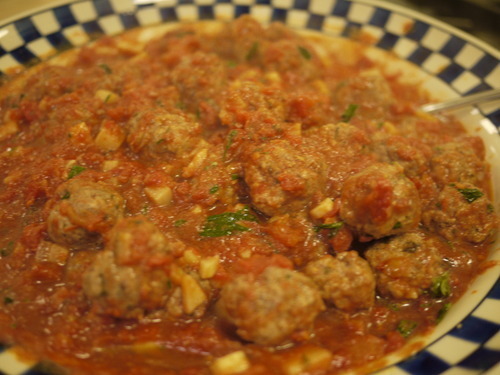
*Trinity meatballs (pork/veal/beef) with zaa’tar, sumac, honey in a tomato-based sauce with mint, roasted parsnip and fennel*
Rohit called upon his love of all these flavors to focus on a brilliant feast made for revelry, hedonism and lots and lots of wine. We enjoyed this spread along with two friends that are getting married this May and will be honeymooning where else, but Morocco.
March 21, 2013
The City of Devi/Lamb Stew, Okra Salad & Pomegranate Martinis
My ennui with the dystopian novel had waned a few years ago when I read Gary Shteyngart’s Super Sad True Love Story. The world was so dismal yet so thrilling that I told myself, “Okay, but that’s it. No more dystopia after this.” Truth be told, I’d become a bit exhausted with the idea, so it wasn’t until I heard Manil Suri himself read a few lines from his new novel The City of Devi that I allowed myself another taste. Suri’s words were so haunting, but not as means to an end. In his third novel, the final part of a trilogy that includes The Age of Shiva and The Death of Vishnu (both of which I’d also enjoyed immensely), Bombay is on the verge of nuclear holocaust, as Pakistan has threatened to drop the bomb that will annihilate the city by the sea for good.
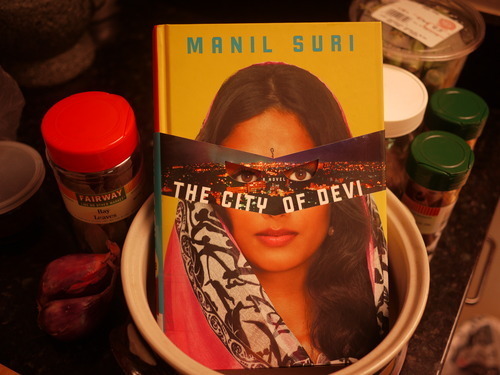
In the midst of all this is Sarita, who is haggling for what appears to be one of the last pomegranates in the wreckage of a previously bombed and looted Crawford Market for some exorbitant price. We learn over time the reason for Sarita’s obsession with this fruit - she is using it as a talisman, a security blanket to lure her husband, who has gone missing, back to her. Amidst the eerie rotational echoes of the air raid sirens, Hindu Sarita finds herself traveling with an unlike companion, the wily gay huntsman Jaz. Pairing with her under the guise of protecting one another from oppositional religious forces in a deeply divided Bombay (Jaz is Muslim), it becomes clear to Sarita after time that Jaz’s motives may not be entirely one dimensional.
As I relayed to Rohit this story of the quintessential dystopian love triangle (who would have thought there could be such a thing), it became clear what the impetus behind this meal should be: two disparate forces that join to become one.
In these winter months, it doesn’t take much to coerce Rohit to simmer comforting, meaty stews on our stove. And so the Muslim half of our meal was envisioned: lamb neck stew with black cardamom, fresh off the plane from not Bombay, but Bangalore. The meat was from a butcher new to our neighborhood - incredibly tender and fresh but steeply priced - and fell right off the bone after hours in the oven.
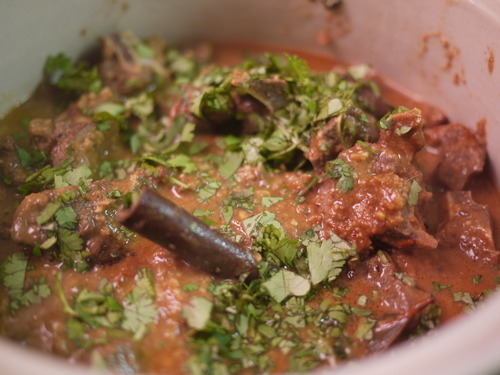
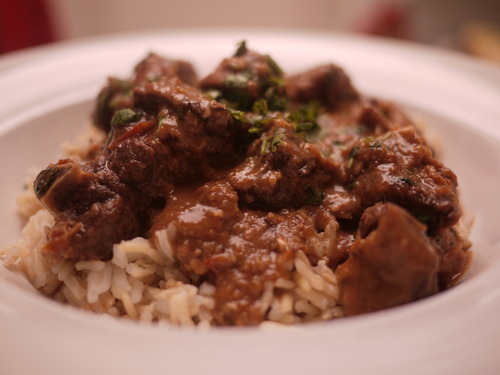
The Hindu contribution to the meal was one of Rohit’s signature dishes: fried okra salad with plum tomatoes and finely chopped shallots. Together, the tanginess from the vinegar of the okra salad and the velvety richness of the lamb neck stew combined to make a partnership that surely would have made even Sarita and Jaz put aside their non religious differences to share a meal.
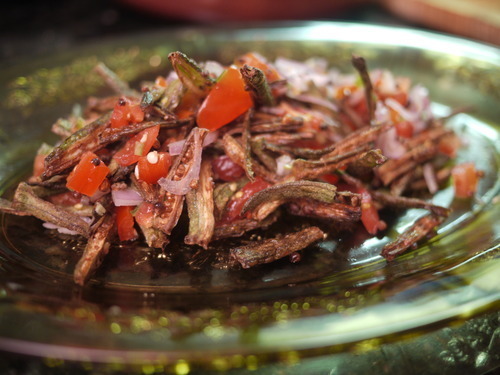
Of course, in these precarious circumstances, alcohol never hurts to help cement a bond. We had to have pomegranate representation in the form of a martini to urge the two along on their dangerous voyage.
